Other People's Bookshelves. Q&A with Andy Lynes.
Read about his interview with Bill Granger and Jamie Oliver.
Q - Hello, Andy. Can you please tell us about yourself and your substack publication?
A - I’m a freelance food, drink and travel writer specialising in chefs and restaurants. I’ve been a regular contributor to The Times and written columns for the Independent and the Telegraph and contributed to food magazines including Delicious, olive and Good Food. I’ve reviewed restaurants for the Metro and written four books about food. I’ve also done a lot more but there isn’t the space to go into it all.
I launched my Substack publication Smashed just over a year ago and it is now my main focus and outlet for my writing. I use the week’s restaurant reviews published in the national press as a way to explore dining trends in the UK. I also poke gentle fun at the critics; as a group of very privileged middle-class people with expense accounts, I think they are fair game for a ribbing.
I also publish regular special editions including interviews with chefs and other restaurant industry figures such as sommeliers and PRs. Currently, I’m publishing twice a week. The Friday Smashed at the Weekend edition almost always includes a recipe from a newly released cookbook and a short review of the book. I have also imported the archive of my blog cookbookreview.blog into Substack. I continue to publish new reviews on the original site but those will move to Substack soon too.
Q - Please tell us about your bookshelves and cookbook collection, what does it consist of and how many do you have?
A - I have never counted the cookbooks in my collection but I estimate the total to be around 400. A few hundred are housed in some Ikea bookshelves in my living room plus a few more in a second bookcase, and there are also piles of books that won’t fit into the shelves that I’m trying to figure out what to do with. I have cookbooks on the shelves of my garden office and more in piles that won’t fit on the shelves that I’m also trying to figure out what to do with. There is another tall bookcase in my garage filled with books and a number of large plastic storage boxes also filled with cookbooks. Thinking about it, there might well be more than 400 books.
I’ve been collecting since the early 80s. The majority are British and American chef and restaurant cookbooks but there are also French and Australian books too. I also have books by food writers like Madhur Jaffrey, Elizabeth David, Jane Grigson, Sophie Grigison, Nigella Lawson and Delia Smith. I have reference works such as The Oxford Companion to Food (to which I contributed an article), Larousse Gastronomique and The Reader Digest Complete Guide to Cookery. I like Phaidon cookbooks and I have a couple of their guides to world cuisines including The Korean Cookbook and Japan: The Vegetarian Cookbook. Numerous cuisines are represented in my collection but I most often cook French, Italian, Spanish or Indian food. I also have quite a few cookbooks on my Kindle. I tend to snap up anything that’s on offer at 99p.
Q - Which cookbooks do you love and use the most and why? Do any of them have a sentimental value?
A - I am constantly updating my collection so I’m often cooking from a recently acquired book, but there are a few I keep going back to, more for practical reasons than sentimentality. Keep it Simple by Alastair Little and Richard Whittington was a revelation to me when it was first published in 1993. It encapsulated the eclectic style of the Modern British movement of the time, encompassing influences from all over Europe as well as Japan and China, so you’ll find recipes for ‘Bejing crispy squab with Chinese seaweed’ and ‘spaghetti alla Genovese’ in the same chapter.
My favourite recipes from the book include ‘salade nicoise’ with a fantastic anchovy dressing, ‘tournedos with polenta and salsa verde’ (I serve the fried polenta with stews and grilled meat too) and ‘wrapped breast of chicken with wild mushrooms’ which is a proper dinner party dish with the breast wrapped in pancetta and cabbage leaves - delicious.
Equally as well-thumbed are Angela Hartnett’s Cucina (‘osso bucco’, ‘penne Bolognese’), Canteen Cuisine by Marco Pierre White (the ‘Sauces and Accompaniments’ chapter is indispensable) and Cooking at The Merchant House by Shaun Hill (‘fantail rolls’, ‘potato and olive cakes’, ‘couscous with spiced vegetables’, ‘fresh goat’s cheese gnocchi’ and ‘somloi’ which is a kind of Hungarian trifle).
Q - Are there any rare or special editions in your collection?
I have a lot of signed cookbooks but I wouldn’t say they are rare. I’ve been collecting for 40 years so I probably have a lot of ‘first editions’ as it were but I doubt they are worth anything. The exception might be a first edition of Great Chefs of France by Anthony Blake and Quentin Crewe which I’ve seen online for silly money.
Q - Can you remember your first cookbook? What was it and do you still have it with you?
A - I can’t remember for certain what my first cookbook was but it’s either 1000 Recipe Cookbook edited by Isabelle Barrett and Jane Harrop or The Sunday Times Complete Cookbook by Arabella Boxer. I lost the 1000 Recipe Cookbook but bought it again about eight years ago, and I still have the Arabella Boxer although I haven’t cooked from it in quite a while. Maybe I will now.
Q - What system do you use to organise or file your books?
A - My books are in complete chaos at the moment but I’ve just begun grouping books by the same author together and am thinking about grouping them by cuisine too. I’m hoping that, in the process of handling the books as I sort them, it will prompt me to open them up, have a flick through and discover recipes I’d previously overlooked.
Q - What is your oldest Cookbook and when was it published?
A - Mrs Beeton’s Book of Household Management, published in 1861. It was a gift from my sister.
Q - Which cookbooks would you recommend and why?
A - That is an impossible question to answer, there are so many recommendable cookbooks and new ones published nearly every week. However, like many home cooks, I like exploring different cuisines from around the world. Some recent books that have inspired me in that regard are:
The Woks of Life by Bill, Judy, Sarah and Kaitlin Leung, a multi-generational take on Chinese cooking that is rammed full of fantastic recipes. I often make ‘Three-Cup Chicken’, it’s so simple and delicious.
Sambal Shiok by Mandy Yin is the cookbook of a popular Malaysian restaurant in London. I can’t think of a better introduction to the cuisine. Her ‘Signature Curry Laksa’ is insanely great.
Vietnamese by Uyen Luu is a beautifully designed book and full of straightforward Vietnamese recipes, many of them aimed at mid-week meals for busy people. I recently made ‘Roast Barbecue Pork’ and served it with ‘Hot and Fiery Greens with Anchovies’ and some plain boiled rice and it went down a storm. There are also more complicated dishes like a banh mi made from scratch, including the baguette, for when you are in the mood for a project.
Q - Do you prefer cookbooks by famous chefs, regional cuisine, or specific themes?
A - I love a restaurant cookbook. I love reading about a chef’s culinary journey and the inner workings of a restaurant as much as the recipes. La Tante Claire by Pierre Koffmann is a favourite.
There are some books, like Eleven Madison Park: The Next Chapter for example, that I would never consider cooking an entire recipe from - they are too complex and time-consuming and with too many expensive ingredients. I’m nevertheless fascinated to read the process behind the dishes and there’s often a technique, or part of a recipe that I can use in my own kitchen, as well as unusual ingredients to discover.
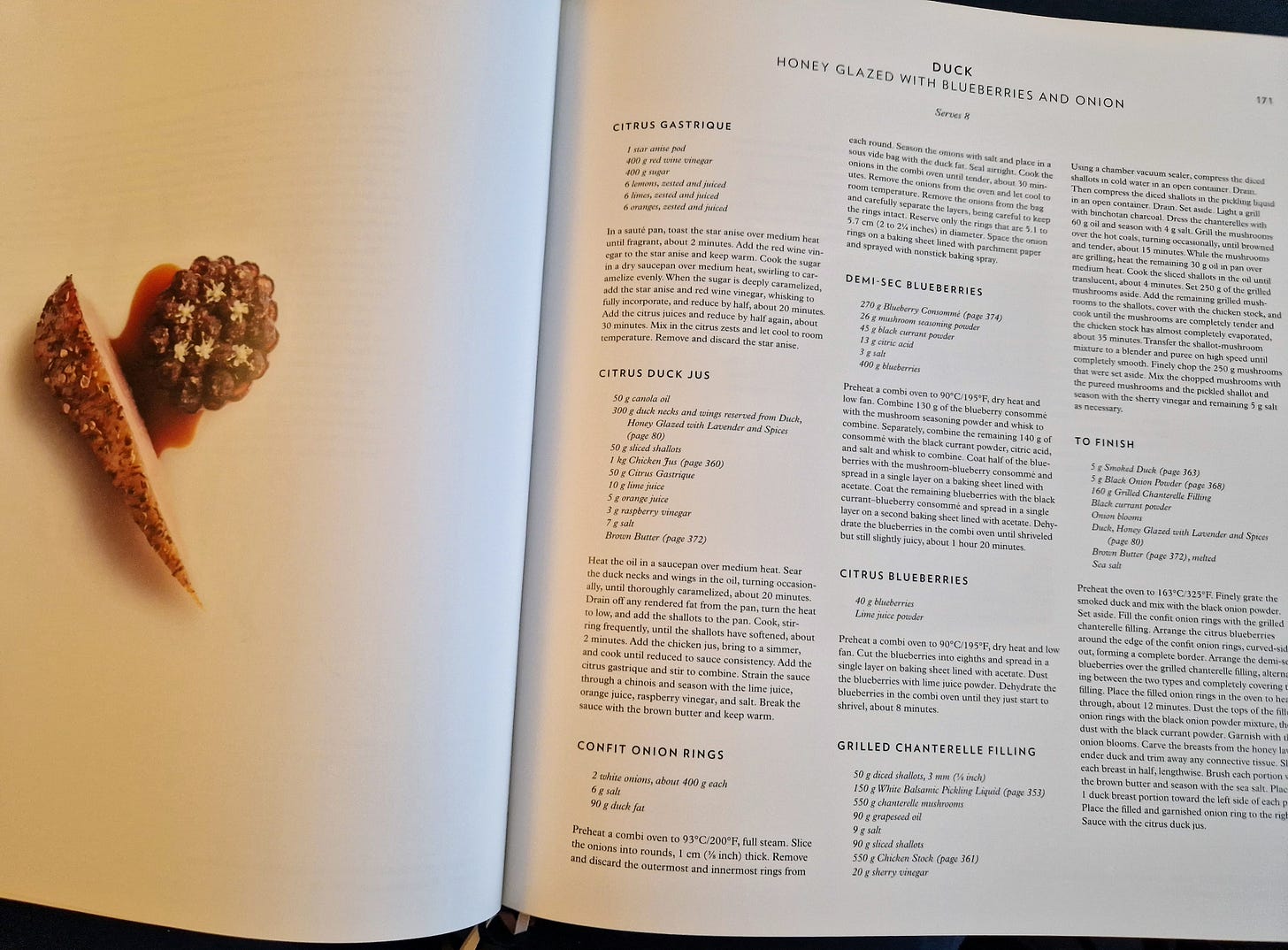
On the other hand, the recently published The Four Horsemen cookbook from the Brooklyn restaurant is full of very doable recipes and tells the story behind the restaurant too. By coincidence, both those books are from American restaurants, which is a particular interest of mine, but I have plenty of UK restaurant cookbooks too.
Q - Which cookbook authors have you met or would you like to meet? Tell us about them.
A - I’ve interviewed many of the chefs and restaurateurs behind the cookbooks that line my shelves but two stand out. The first is the late Bill Granger who I met on a number of occasions. He just radiated good vibes and was a delight to be around. His books changed the way I cooked. I went through quite a long period of cooking complex, restaurant-style dishes inspired by meals out and my experiences ‘staging’ in professional kitchens. I was very uptight about the whole thing and cooked like I was being judged by some unseen head chef. Then I bought Everyday (published in 2006) and started cooking things like ‘chilli bean burritos with corn salsa’ and ‘steak with cherry tomatoes and cannellini beans’ that tasted great but didn’t take all day to make. I never looked back. I still enjoy cooking the fancy stuff, but Granger made me realise I didn’t need to do that every time I went into the kitchen.
I’ve interviewed Jamie Oliver several times. The first time I met him I was properly starstruck. It was at Penguin Books HQ in central London. You could tell that the whole office was very excited about him coming in, there was a palpable air of anticipation. He had that aura of fame about him but once we got talking he was like an excitable kid. We overran the allotted time for the interview by a good 20 minutes; once he got going you couldn't stop him. It was just a joy to hear him enthuse about food and cooking and to be around someone with that much energy. And he gave me a box of cakes to take back to the Metro newspaper office where I was working at the time which was a very sweet gesture.
Q - Is there anything else you would like to add about your bookshelves and book collection that I haven’t asked?
A - I’m always amazed when people say they never use recipes when they cook. I have enough experience in the kitchen to not have to rely on recipes but I really enjoy the process. Good cookbooks are a repository of hard-earned culinary knowledge and experitse. Following recipes is a great way to learn more about cooking, discover new ingredients and techniques and improve and expand your home cooking repertoire in ways that would be very difficult to achieve by yourself.
Thank you so much
for sharing your bookshelves and cookbook collection with us.Read more of Other People’s Bookshelves Q&A with …
Other Links;
Main Library | Recipes | Kitchen Tips | FSL Index | Q&A: Other People’s Kitchens | Q&A Other People’s Bookshelves | FoodStack Reads | Recommendations

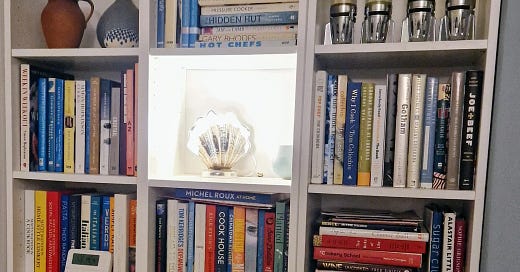




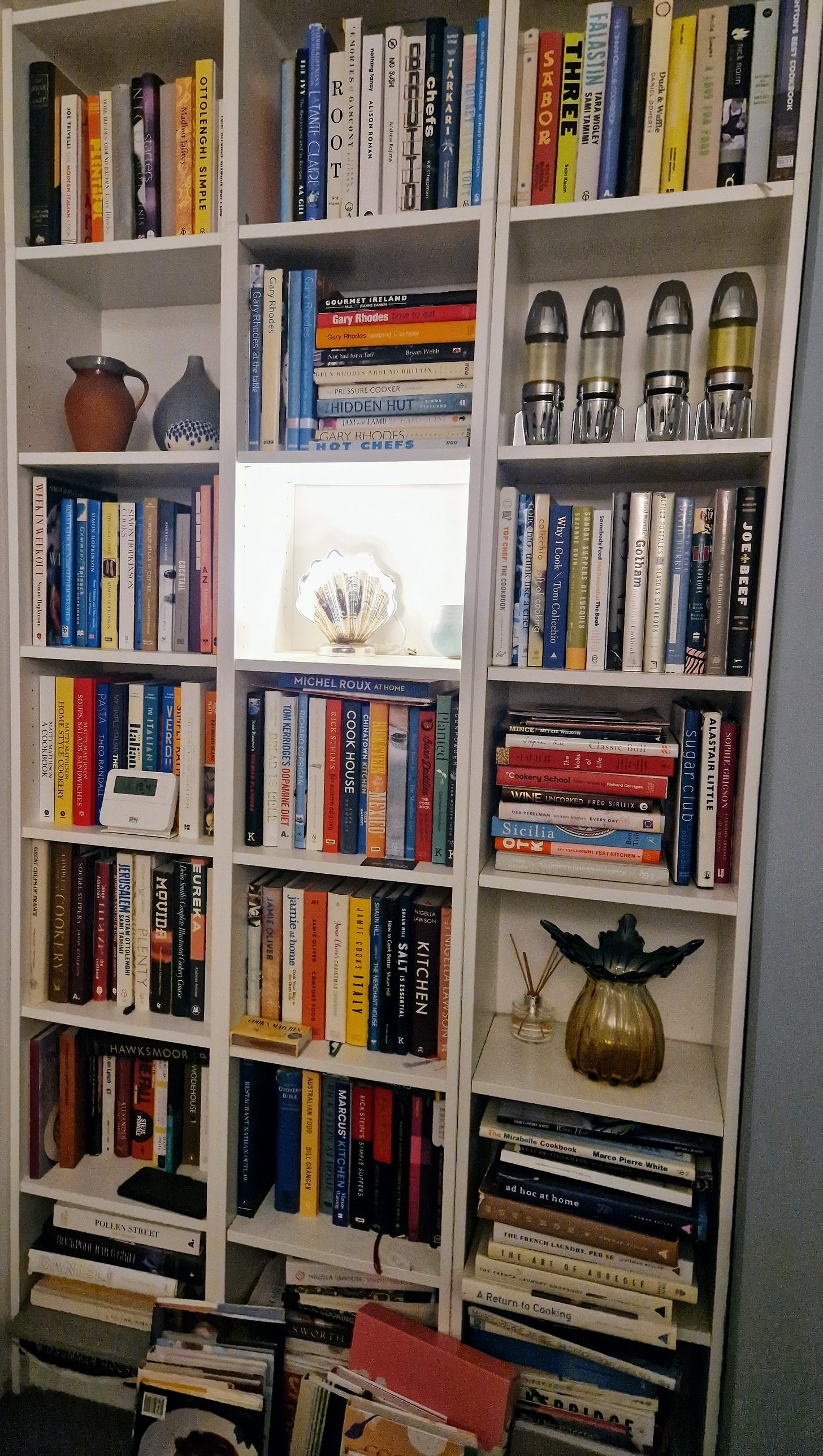

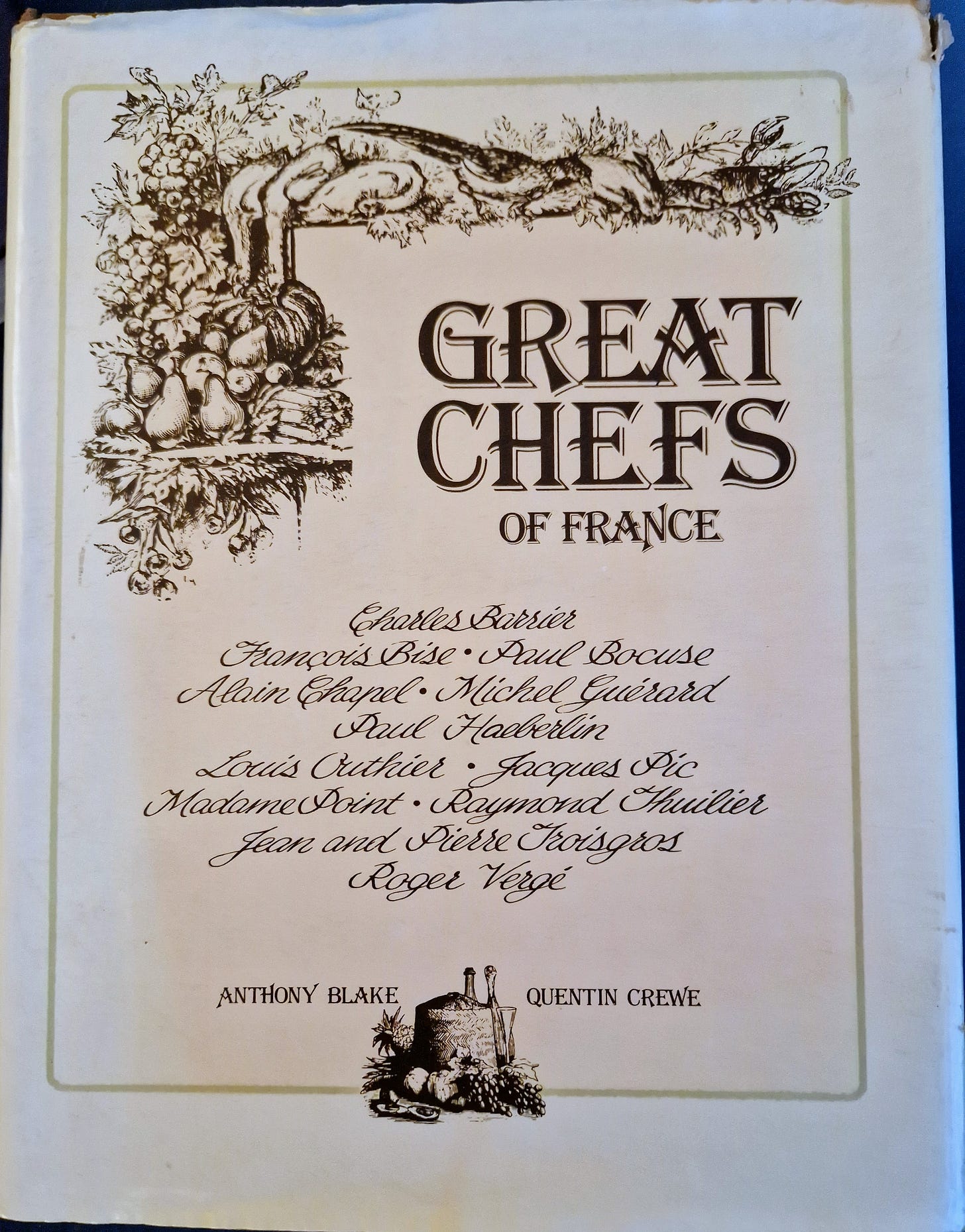
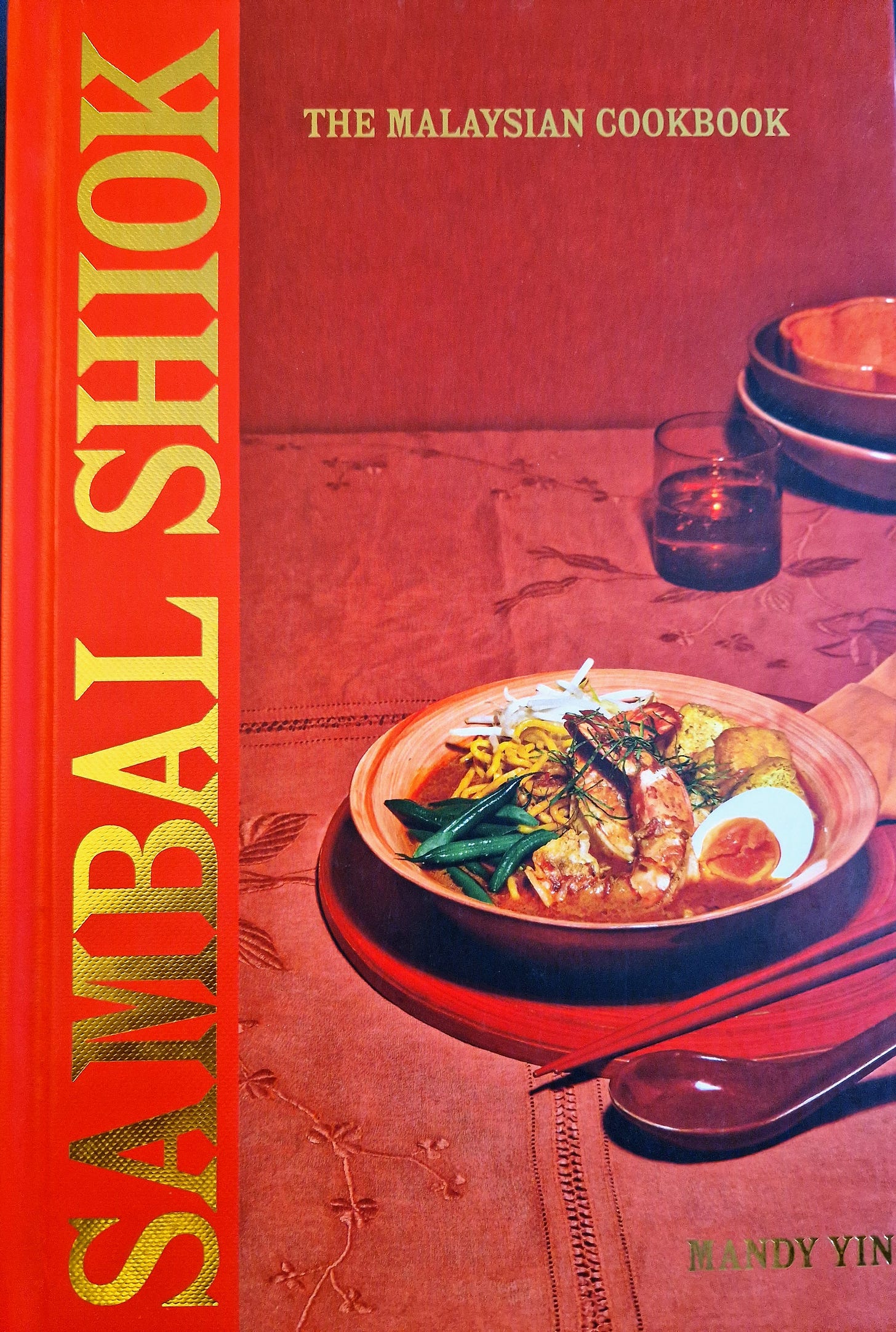
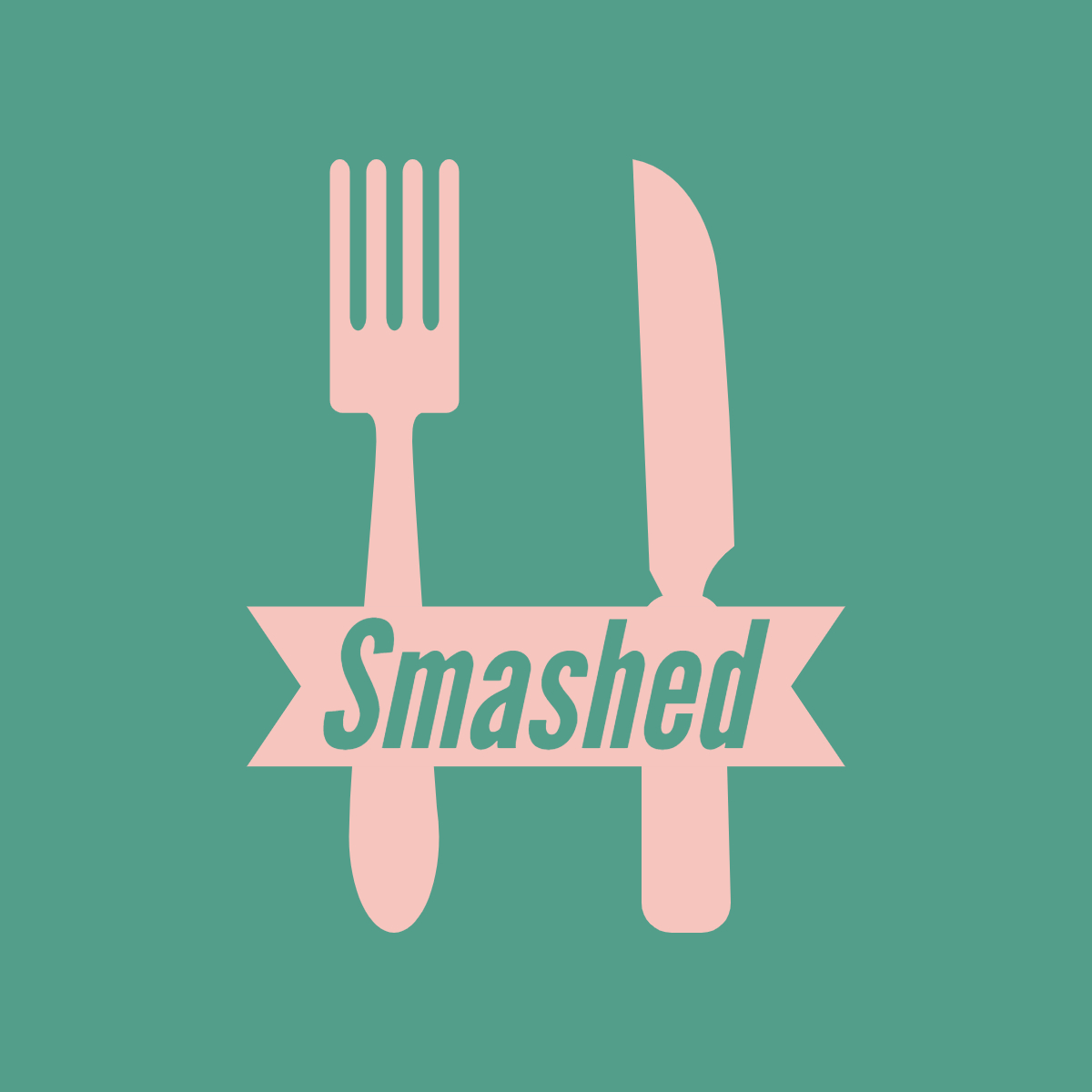

Great 💕😋💕